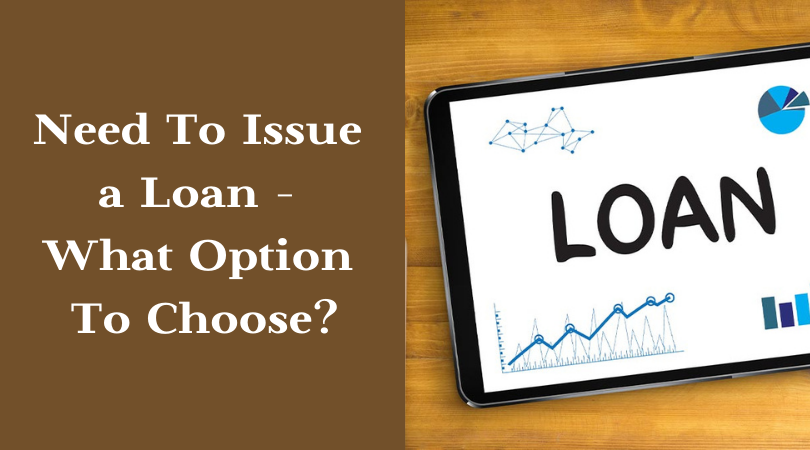Need To Issue a Loan – What Option To Choose?
 Whatever the situation you decide to use borrowed funds, you need to remember: if you decide to borrow, you must be sure that you can pay it back. The choice of a specific type of loan depends on what you are going to spend money on and what amount you need for this. The purpose depends on which loan terms are right for you. The term in which you repay the loan depends on the amount you need and how much you can pay per month. All these parameters determine the choice.
Whatever the situation you decide to use borrowed funds, you need to remember: if you decide to borrow, you must be sure that you can pay it back. The choice of a specific type of loan depends on what you are going to spend money on and what amount you need for this. The purpose depends on which loan terms are right for you. The term in which you repay the loan depends on the amount you need and how much you can pay per month. All these parameters determine the choice.
Credit or Loan?
The principles of lending are payment, repayment and urgency. This means that you always have to pay for the use of borrowed funds (as a rule, a certain rate), and the debt must not only be repaid, but also done exactly on time. At the same time, there are a great many options for loans and borrowings, depending on the terms, terms and requirements for the borrower.
The more convenience for the borrower – in order of terms or requirements – the higher the risk for the lender and, therefore, the higher the cost of the loan or credit. Therefore, there is a solution for each specific situation.
Targeted or non-targeted loan?
Large-scale goals require more money, which means that it will take longer to repay the loan. In addition, it depends on whether you disclose the purpose of the loan to the bank or not, what terms the bank will offer you.
Long-term loans are repaid for more than 5 years. As a rule, it is taken with a clearly formulated purpose – to buy land, a car or housing. For this, there are special types of loans, such as mortgage and auto loans. They have their own characteristics related to insurance, collateral, requirements for borrowers. But at the same time, such loans are more profitable than non-targeted consumer loans.
A non-targeted loan is issued for any purpose, that is, you do not have to report your spending to the lender. But the interest rate on such a loan is likely to be higher than that of the targeted. Non-targeted loans are also bad credit loans Oregon. It is likely to be issued if your credit score is not perfect. It takes few time to be deposited. Besides, such loans may help improve your credit score.
For planned large expenses, such as medical treatment, renovation or your dream honeymoon, a consumer loan is suitable, which is usually issued for a medium term.
For small expenses, a credit card is suitable, of course, if you issue it in advance, or a payday loan if you have an acute lack in not only money, but also time.
Also, do not forget about express loans, which are often offered for a specific purchase directly in a store – for example, a washing machine in a household appliance store. Such loans have their advantages: they are issued in the store directly, very quickly, with a minimum of documents, but the interest on them is higher than on a regular consumer loan.
With or without a guarantee?
The more evidence the lender has that you are a reliable client, the more willingly he will lend you. Here, a good credit history, documents confirming solvency, pledge or surety can be used.
Collateral is your property, money or valuables that you guarantee to give to the bank if you do not pay off the loan. If you take out a mortgage or auto loan, the real estate or the car itself becomes the collateral.
A surety is an obligation that your friend or relative makes to the creditor. This person signs an agreement that guarantees that you will repay the loan or credit back. If you cannot do this, the lender will force your guarantor to pay.
A co-borrower is a person who takes out a loan with you. Usually it is a close relative. He is also responsible for paying off the debt. Usually co-borrowers are attracted when it comes to a large amount, and the income of one person is not enough to pay off such a loan. A loan with collateral or surety is called secured. The co-borrower is another guarantee for the lender that you will get the money back.
Unsecured loans are issued without collateral or surety. This is a risk for lenders, so usually such loans are issued at a higher interest rate than secured loans. But there are also exceptions: for example, banks often offer preferential rates for salary clients (those who receive salaries on the card of this bank).
How will you repay the loan off?
You can repay a loan in different ways, gradually or at a time. There are two ways to gradually pay off:
Differentiated payments. The principal amount of the loan is divided into equal parts, and the interest payment decreases every month. In the first month, you will pay the largest payment, and in the last month, you will pay the smallest.
Annuity payments. Throughout the entire time, the amount of the monthly payment will not change. With annuity payments, it is more convenient to plan your budget. However, due to the fixed payment, you are likely to end up paying the bank more than with the differentiated payment.
You can repay the loan at once, which is typical for short-term loans. This allows you to postpone the repayment of the loan and the interest until the end of the term under the agreement, but requires the borrower to have the entire amount by this date. It is worth taking out such a loan only if you know for sure: when the time comes to repay it, you will have the required amount.
So what loan should you choose?
You have to choose from ready-made loan offers. Formulate how long it will take you to repay the loan, whether you will tell the bank about what you are taking the money for, and whether you are ready to issue a collateral. These are your basic requirements for a loan.
But how exactly you will pay it off – in equal installments or the amount will decrease every month – depends on the terms of the particular loan.
Before issuing a loan, be sure to check whether your chosen lender has a special permit from the Central Bank (license or certificate).
Explore different options, when you select the best offer for yourself, do not forget to find out the full cost of the loan with all interest and payments.
Keep in mind that your debt load should not exceed 30% of your monthly income, otherwise you are at great risk.
Following these simple rules, you can successfully use credit products without the risk of falling into a debt trap.




